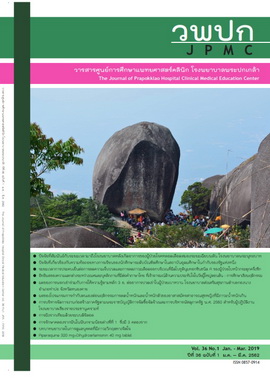Factors related to Hospital Arrival Time after Symptoms Onset in Patients with Acute Stroke in Phra-putthabat Hospital
Main Article Content
Abstract
Background: Factors related to hospital arrival time after the onset of symptoms in patients with acute stroke remain unclear. Further, many patients arrive at a hospital too late to provide thrombolysis with the intravenous recombinant tissue plasminogen activator.
Objective: To assess hospital arrival time after the onset of symptoms and the factors associated with arrival time among patients with acute stroke at Phra-phutthabat Hospital.
Materials and methods: This study used a correlational design. Purposive sampling of 123 transporters of patients with acute stroke at Phra-phutthabat Hospital was carried out. Data was collected from a medical ward at Phra-phutthabat Hospital using a questionnaire survey. Data collection was conducted from october to december 2016.
Results: Approximately twenty-seven percent (26.8%) of samples presented within 3 hours after onset of symptoms. Mean time for hospital arrival time after onset of symptoms was 16.77 hours (SD=19.09). Perceptions about stroke severity among the transporters had a significant impact on arrival time after onset of symptoms (p<0.01). Further, they could significantly predict hospital arrival time (p-value < 0.05) (odds ratio = 1.25, 95% CI: 1.05-1.48, p-value=0.01). The better the perception among transporters concerning stroke severity, the more percentage of patients arriving at a hospital within 3 hours increased by 24.6%.
Conclusion: The most significant factor related to predicting hospital arrival time of patients with acute stroke was the perception about stroke severity among the transporters.
Article Details
References
Jauch EC, Saver JL, Adams HP Jr, Bruno A, Connors JJ, Demaerschalk BM, et al. Guidelines for the early management of patients with acute ischemic stroke: a guideline for healthcare professionals from the American Heart Association/American Stroke Association. Stroke2013;44:870-947.
Lozano R, Naghavi M, Foreman K, Lim S, Shibuya K, Aboyans V, et al. Global and regional mortality from 235 causes of death for 20 age groups in 1990 and 2010: a systematic analysis for the Global Burden of Disease Study 2010. Lancet 2012;380:2095-128.
Goldstein LB, Bushnell CD, Adams RJ, Appel LJ, Braun LT, Chaturvedi S, et al. Guidelines for the primary prevention of stroke a guideline for healthcare professionals from the American Heart Association/American Stroke Association. Stroke2011; 42: 517-84.
Ministry of Public Health. Thailand medical services profile 2011-2014 (Thai Medicine 2011-2014).Bangkok: Department of Medical Service; 2014.
Ministry of Public Health. Public health statistic 2014. Bangkok: Bureu of Policy and Strategy; 2014.
Dharmasaroja P. Ischemic stroke. Bangkok: Charan-Sanitwong Printing; 2012.
Lees KR, Bluhmki E, von Kummer R, Brott TG, Toni D, Grotta JC, et al. Time to treatment with intravenous alteplase and outcome in stroke: an updated pooled analysis of ECASS, ATLANTIS, NINDS, and EPITHET trials. Lancet2010;375:1695-703.
Saver JL, Fonarow GC, Smith EE, Reeves MJ, Grau-Sepulveda MV, Pan W, et al. Time to treatment with intravenous tissue plasminogen activator and outcome from acute ischemic stroke. JAMA 2013;309:2480-8.
Wardlaw JM, Murray V, Berge E, del Zoppo G, Sandercock P, Lindley RL, et al. Recombinant tissue plasminogen activator for acute ischaemic stroke: an updated systematic review and meta-analysis. Lancet2012;379:2364-72.
Binthaisong T. Factors related to onset arrival time in patients with acute stroke. Kuakarun Journal of Nursing 2013;20:15-29.
Teuschl Y, Brainin M. Stroke education: discrepancies among factors influencing prehospital delay and stroke knowledge. Int J Stroke 2010;5:187-208.
Lekpet J, Wuthisuthimethawee P, Vasinanukorn P. Prehospital time and emergency department time for acute ischemic stroke care at Songklanagarind Hospital. Songkla Med J 2009;27:203-12.
Pinyosree N. Factors related to seeking treatment after the onset of acute ischemic stroke patients [dissertation]. Bangkok, Chulalongkorn University; 2008.
Ratanakorn D, Keandoungchun J, Sittichanbuncha Y, Laothamatas J, Tegeler CH. Stroke fast track reduces time delay to neuroimaging and increases use of thrombolysis in an academic medical center in Thailand. J Neuroimaging 2012;22:53-7.
Kim HJ, Ahn JH, Kim SH, Hong ES. Factors associated with prehospital delay for acute stroke in Ulsan, Korea. J Emerg Med 2011;41:59-63.
Sim J, Shin CN, An K, Todd M. Factors associated with the hospital arrival time in patients with ischemic stroke in Korea. J CardiovascNurs 2016;31:E10-6.
Faiz KW, Sundseth A, Thommessen B, Rønning OM. Factors related to decision delay in acute stroke. J Stroke Cerebrovasc Dis 2014; 23:534-9.
SIm J, AHn D, Shin CN. Abstract T P251: Factors for delayed medical care seeking among elderly stroke patients in Korea. Stroke 2014;45(Suppl 1) :ATP251.
Koksal EK, Gazioglu S, Boz C, Can G, Alioglu Z. Factors associated with early hospital arrival in acute ischemic stroke patients. NeurolSci 2014;35:1567-72.

